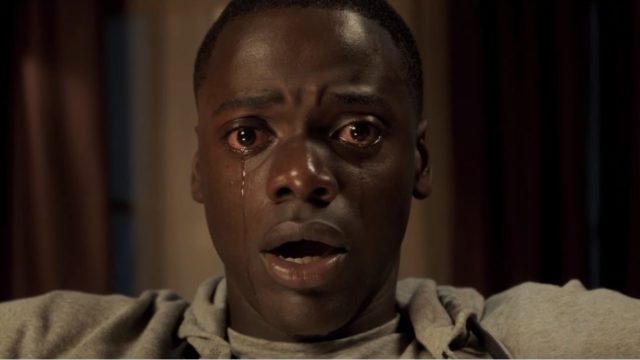The intrigue of Jordan Peele’s first directorial debut, GET OUT, promises an understandably awkward meeting of prejudices that could be a horror show in of itself just on the merits of a post-Obama America. The tale of Chris (Daniel Kaluuyah) venturing out into the secluded suburbs to meet the family of his girlfriend (Alison Williams) offers immediate tension already, add in the complexities of Chris being a black man and his girlfriend Rosie being white, you already have a film that is sure to be a gripping endurance for the audience. However the film takes this rather basic setup and puts race at the heart of its tension, exemplifying the stark contrast of Chris’s world and experience versus that of Rosie’s family and their company in a way that forces the audience to expect immediate confrontation that is too familiar with real-world parables. Benevolent racism pours out of the film’s dialogue, either out of ignorance or cruelty, in a manner that states that these kind of relationships might never fully heal due to generational and economical differences.
This in itself sets Chris up for a trap he’s not prepared to handle, surrounded by very few black people who have long since been victimized not by the innocent racisms of “I know a black person” ignorance that comes out of many of the white character’s mouths but an entirely different kind of horror that on a textual level is disturbing and relatable in the sense that as an audience member you do not want these horrible things happening to you but on a subtextual level is something many people might not even recognize. That is, the horror of oppression, which given today’s political climate is becoming a very real waking horror for many folks who don’t fit a certain kind of affluent-white-male demographic. With this in mind, GET OUT eschews the more obvious parallel of racial oppression than one might assume, asking us instead to reconsider what we gain out of racial cultures and the tendency to appropriate racial boundaries into white generalizations.
In a sense, GET OUT is targeting the kind of people who want to liberate the N-word without consequence of using it because black people have appropriated it into their own lexicon after hundreds of years of shifting historical significance. They want to call someone the N-word without the weight of the meaning behind the word because it sounds cool when a black person says it. It’s a kind of counter-racism that believes a difference of centuries erases the tragedies that plague African American history. There’s a greediness behind this, the kind that doesn’t allow black people to live freely of prejudices about their education, their mannerisms, how they speak, their livelihood, and what have you because that would mean that everything is actually normal and the last standing difference simply becomes a matter of skin color.
What’s most interesting about GET OUT is that it’s showcasing a more nuanced form of racism that isn’t about malevolent violence against people of a different race but rather the kind of manipulation that just wants to take what these cultures have offered. Pop culture is littered with white artists and musicians who lifted their material from those persons of color who crafted it first; those are the villains of GET OUT. Because it could be easy to make parallels to police brutality, white oppression and violence, the kind of things that Jordan Peele and Keegan Michael-Key had no issue confronting on their show KEY AND PEELE. Instead it’s as thought you’re explaining to someone the dismantling of the Greenwood neighborhood as a result of the Tulsa race riots of 1921 and instead of saying it’s because it was a black neighborhood and white supremacists didn’t want them to have their own sustainability; but rather the white supremacists wanted to secure personal sustainability that the black neighborhood was successfully achieving*. It’s a form of gluttony that says the hands we are dealt are still not enough, and how can we take that of which others already have in ways that we do not?
The only thing that GET OUT doesn’t fully answer is why specifically black people are targeted for this? Although it’s easy to deduce once again that the greediness stems from gratuitous ignorance of that of which the villains here do not simply understand; they’ve put their own metaphorical divisions between races that just don’t exist other than to separate their devious activities and reduce their victims in a way that dehumanizes them. All of this is achieved without pinpointing the obvious racial issues of the modern age which makes this a film unstuck in time; GET OUT could have been made in the 60s and been just as successful because it does use themes of oppression, familial conventions and traditions, loss and grief, only heightened by this element of racial tension. The fact that this is a genre film that uses black main characters is an example of how there is a shift in mainstream media and how audiences are receptive to media created by and starring people of color. It’s the simplicity of the premise and the economy of the writing that makes this movie worth watching, something the Peele really understands about the horror genre and something that audiences are going to be really engaged with.
*I do speak in psychology-based hypotheticals. The Tulsa riots were a result of a society that normalized lynching, particularly men, which I think was important for this film to have as its lead character. It’s the ripple effect that came out of those riots that I was thinking about while watching and writing about this movie; because Chris is part of something more sinister than he realizes, something going on long before he came around. I’m not trying to trivialize an example of one of the most extreme acts of racial violence down to “hey something bad happens to this guy too!”

